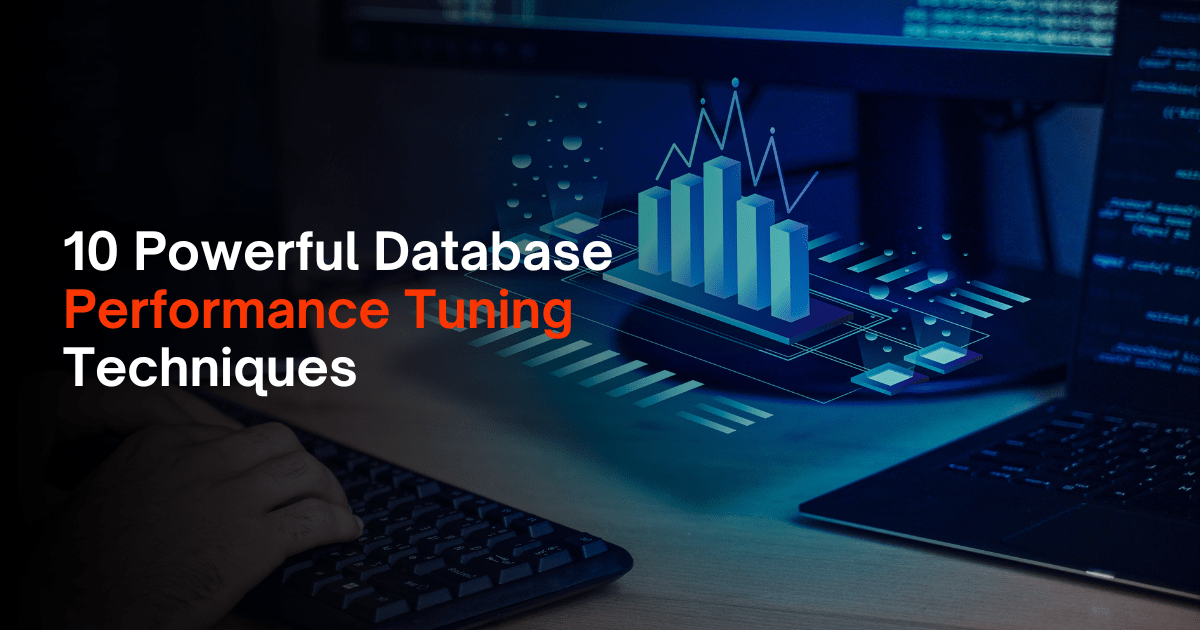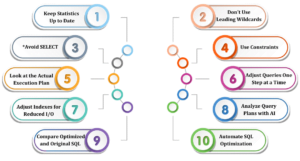
Have you ever noticed your computer running slow? It might not be the hardware itself, but the way data is being accessed and retrieved. This is where Database Performance Tuning Services comes in.
Databases are the backbone of many applications we use today. They store and organize vast amounts of information, but just like a cluttered filing cabinet, an unoptimized database can lead to slow response times and frustration. Database Performance Tuning is the process of streamlining how data is accessed, making your queries run faster and your applications more responsive.
While there are many reasons databases can underperform, poorly written queries and inefficient indexing are two of the most common culprits. Simple Logic is an expert in Database Performance Tuning Services. We can help you identify bottlenecks and optimize your database for peak performance.
Refining Your Approach to Database Performance Tuning
The first step to Database Performance Tuning is understanding the specific issues you’re facing. There’s no magic bullet, but here are 10 best practices that can significantly improve your database’s speed and efficiency:

- Keep Statistics Up to Date: Imagine a library with a messy card catalog. It takes longer to find the book you’re looking for. Similarly, databases rely on up-to-date statistics to optimize how they retrieve data. Simple Logic can ensure your database statistics are current, leading to faster queries.
- Don’t Use Leading Wildcards: Think of wildcards as asterisks (*) in search terms. Leading wildcards, like searching for “apple” in a library catalog, force the database to scan the entire collection. This is slow and inefficient. Contact Simple to learn how to write more efficient queries that avoid leading wildcards.
- *Avoid SELECT: This might seem like a shortcut, but retrieving every column from a large table is like pulling out every book in a library at once. It’s slow and unnecessary. Specify only the columns you need for faster results. Simple Logic can help you identify and optimize your queries to avoid unnecessary data retrieval.
- Use Constraints: Constraints are like rules in a library, ensuring books are filed correctly. They can improve query speed by helping the database optimizer choose the best execution plan. However, constraints can also require more memory. Simple Logic can help you find the right balance between speed and efficiency when using constraints.
- Look at the Actual Execution Plan: Imagine a map to a treasure in a library. An estimated map might not be very accurate. Similarly, estimated execution plans for queries might not reflect reality. Contact Simple Logic to learn how to analyze actual execution plans for optimal tuning.
- Adjust Queries One Step at a Time: When tuning a car engine, you adjust one setting at a time. The same applies to queries. Make small, targeted changes, focusing on the most expensive operations first. Simple Logic can guide you through the process of incrementally optimizing your queries for better performance.
- Adjust Indexes for Reduced I/O: Data retrieval is like fetching books from shelves. Indexes are like labelled sections in a library, making it faster to find specific books. By adjusting indexes, you can reduce the amount of data the database needs to scan, improving performance. Simple Logic is an expert in database indexing and can help you optimize your indexes for faster data retrieval.
- Analyze Query Plans with AI: Artificial intelligence (AI) can be a powerful tool for Database Performance Tuning. AI can analyze your execution plan and suggest optimizations, making your database operations more efficient. Simple Logic stays up-to-date on the latest database technologies, including AI-powered optimization tools.
- Compare Optimized and Original SQL: When tuning a car engine, you compare the performance before and after adjustments. Similarly, compare the original SQL statement with the optimized version. Simple Logic can help you track and measure the improvements gained through database performance tuning services.
- Automate SQL Optimization: Just like setting your cruise control on a road trip, automated SQL optimization tools can take the wheel. These tools can analyze and rewrite your queries or optimize indexes to find the best configuration for performance. Simple Logic can help you implement automated SQL optimization tools for ongoing database performance management.
Conclusion: Keeping Your Database Running Smoothly
Database Performance Tuning is an ongoing process, not a one-time fix. By focusing on optimizing queries, cleaning up indexes, and staying up-to-date on best practices, you can ensure your database runs smoothly and efficiently. This translates to faster response times, happier users, and a competitive edge for your business.
Simple Logic is a leading provider of Database Performance Tuning services. Our team of experienced database administrators can help you identify bottlenecks, optimize your databases.

